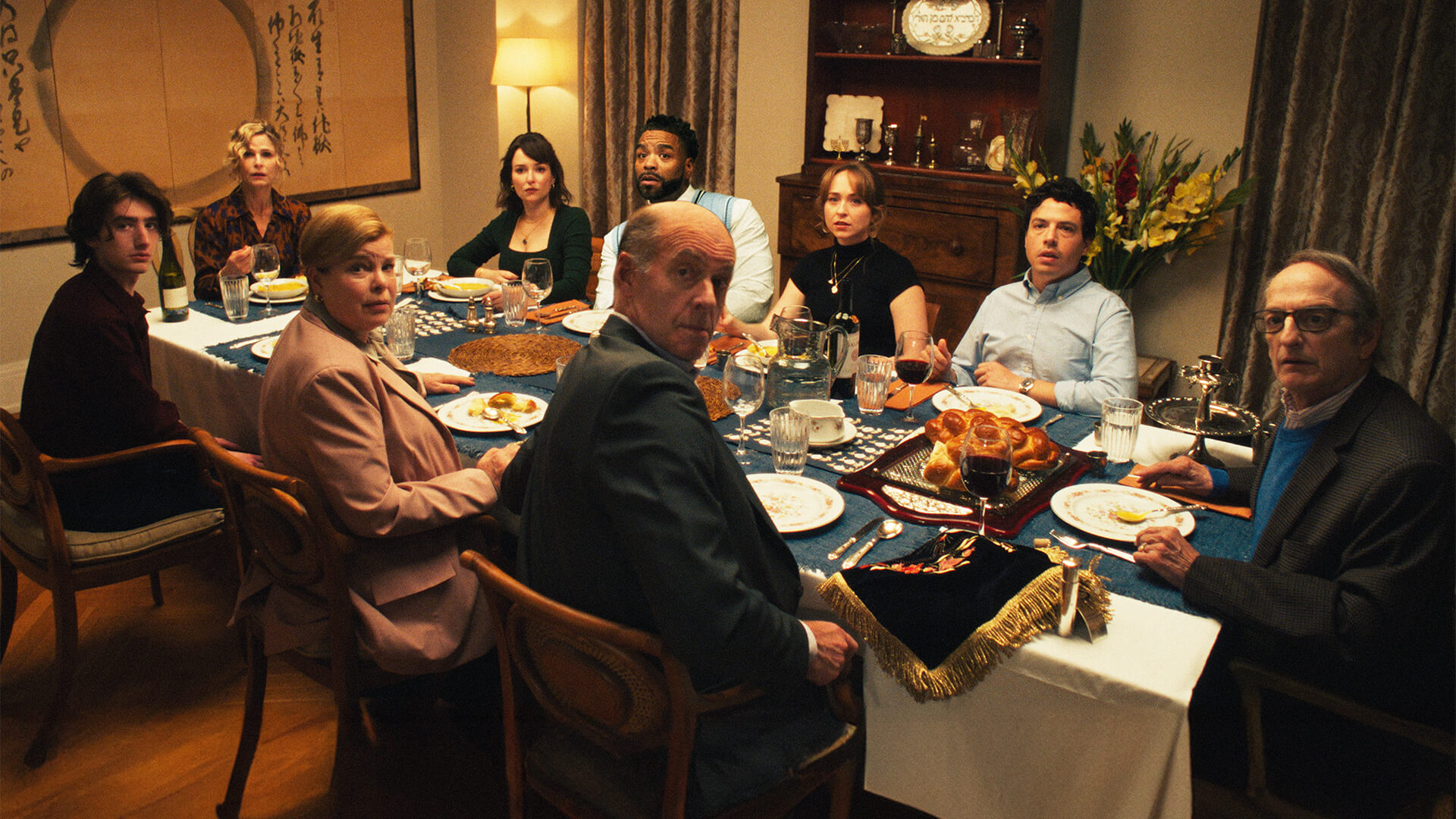This Jewish comedy was the summer’s sleeper hit — and you’ve probably never heard of it
‘Bad Shabbos’ did not get a big theatrical release, but instead was distributed through small theaters and synagogues

The Shabbat dinner that anchors the film. Photo by Menemsha Films
At a turbulent moment for moviegoing — when the theatrical experience is challenged by streaming and a change in viewing and film release patterns — one unlikely film has emerged as the sleeper hit of the summer.
Bad Shabbos has been showing for 14 weeks and counting at the Quad Cinema in New York, where it’s been the theater’s number-one film of the season, and the movie has made over 1.5 million in the box office nationally.
This dark comedy, distributed by niche, Jewish-focused company Menemsha Films, is on track to become a record-breaking box office success for the boutique distributor, which acquired the film after it won the Audience Award at the 2024 Tribeca Film Festival.
Bad Shabbos opens with two elderly Jewish men telling jokes on the streets of the Upper West Side of Manhattan — until a body suddenly falls from above, mid-punchline. That shocking, hilarious moment sets the tone for what follows: a Shabbat dinner gone wildly off the rails.
The film takes place over one Shabbat dinner in a Manhattan apartment, as the traditionally Jewish Gelfand family plans to host their son’s fiancée’s non-Jewish parents who are eager to learn about the Jewish tradition of a Shabbat dinner. Before the in-laws-to-be arrive, an accident kills one of the dinner guests and the Gelfand’s are eager to hide the corpse, creating a hybrid of Meet The Parents and Weekend at Bernie’s.

Directed by Daniel Robbins, Bad Shabbos is a modest production, shot in just 18 days in two locations. Yet it boasts surprising star power: Kyra Sedgwick anchors the cast as the family matriarch, while Cliff “Method Man” Smith steals the show as the building’s resourceful doorman. The story may not be revolutionary, but the execution is sharp, with pitch-perfect comedic timing and a willingness to tread into darkly satirical territory rarely seen in today’s cautious/politically correct climate, such as when the in-laws try to bond with the Jewish couple over a discount he received.
What’s most remarkable, though, is how audiences have embraced the film. Without the muscle of a major marketing campaign, Menemsha leaned into old-school community engagement. After Tribeca, the film played the thriving Jewish film festival circuit, sweeping both audience and programmer awards in a survey by the Jewish Film Presenters Network. The theatrical release strategy was equally unconventional: It started with a winter run in theaters in South Florida — prime season for Jewish retirees — including a 17 week sold out run at Paradigm Gateway in Fort Lauderdale. Then it expanded to New York, where screenings at the Quad, the JCC Manhattan, and New Plaza Cinema sold out all summer long.
The filmmakers themselves became part of the phenomenon, traveling tirelessly for Q&As. At each event, they entertained audiences not only with behind-the-scenes anecdotes but with candid banter about Jewish observance. (Robbins, who grew up Orthodox and attended Ramaz, was also game for curious grandmothers who tried to set him up with their granddaughters.) According to the distributor, Bad Shabbos has reached over 175 theaters nationwide. Still, the film has largely relied on word of mouth for its publicity.
The JCC in Manhattan’s Carole Zabar Center for Film, of which I am the director, is one of the leading presenters of Jewish films in the US. we describe our current era as a golden age of Jewish filmmaking, with more Jewish-themed films being made than ever, and too many good films for all their weekly film presentation slots. Yet since October 7 — amid rising antisemitism and heightened political sensitivities — distributors and theaters alike have become wary of programming Jewish content.
Just this week over one thousand filmmakers signed a pledge to boycott Israeli film related institutions and productions. Distributors, festivals and institutions have been shying away from Jewish films. Theaters in Philadelphia and London have pulled out of Jewish film festivals. The Toronto International Film Festival went from being one of the leading showcases for Israeli films internationally to attempting to cancel the screening of its one Israeli themed film. Theaters and distributors may fear backlash, or want to potential controversy.
That hasn’t stopped Menemsha. They’ve screened the film wherever they could, at community centers and synagogues, as well as over 150 screenings at festivals — including one unforgettable showing at the Fire Island Synagogue, where laughter spilled onto the street from the tiny wood-frame building.
Menemsha also runs the Jewish-themed streaming site: ChaiFlicks. Bad Shabbos could have gone straight to this streaming platform after a festival run. But they understood that this film is most effective when seen together. Laughter is contagious at comedies like this, and seeing it with an audience that is rolling with laughter in their seats enhances the experience. (Bad Shabbos will be landing on Chai Flicks on Sept. 16.)
Not everyone has been charmed. Some critics have complained that the film is “bad for the Jews” because it traffics in clichés, with at least one JCC audience member threatening a boycott. Others have tried to read it as a statement of being complicit in a sin. But most viewers see what the filmmakers intended: a raucous, unapologetic comedy.
And maybe that’s exactly what we need right now. At a time of polarization, grief, and rising antisemitism, when Jewish communities in America are reeling and divided, laughter is no small thing to bring us together. If Bad Shabbos has brought joy to thousands of people in a dark moment, then that alone is a mitzvah.

















